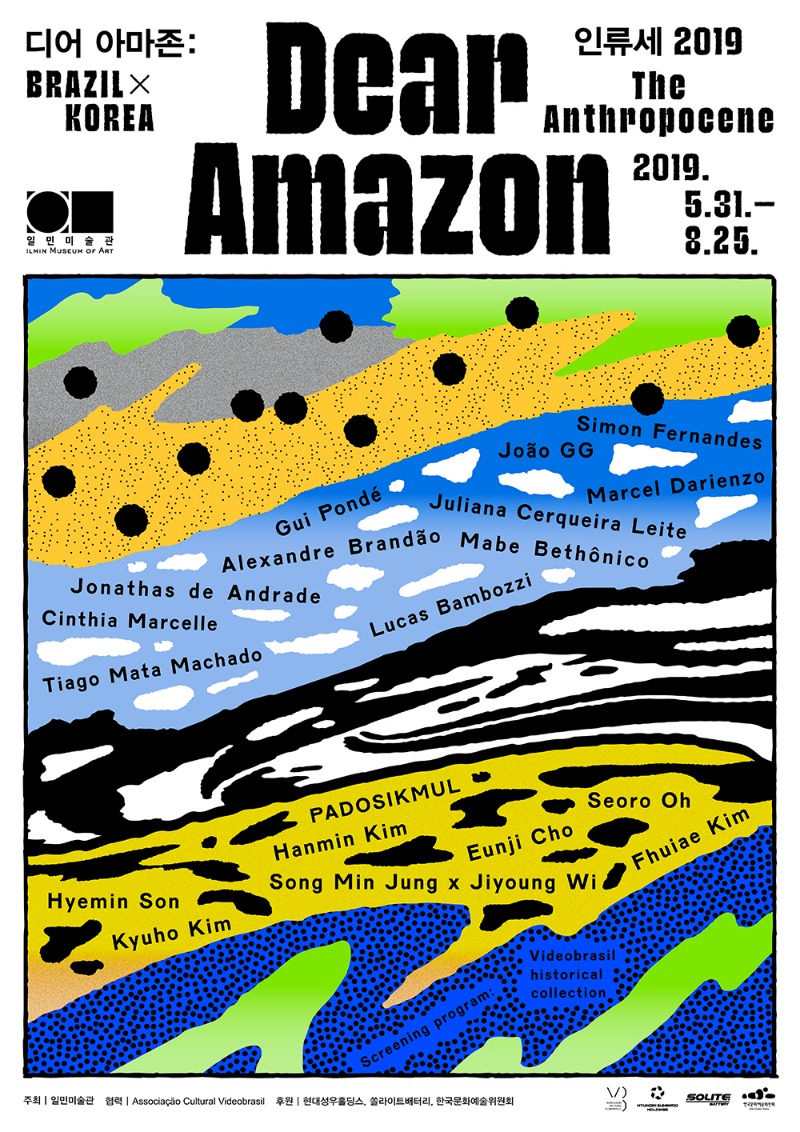
| Period| | 2019.05.31 - 2019.08.25 |
|---|---|
| Operating hours| | 11:00 - 19:00 |
| Space| | Ilmin Museum of Art/Seoul |
| Address| | 152, Sejong-daero, Jongno-gu, Seoul, Republic of Korea |
| Closed| | Monday, January 1, Lunar New Year's Day |
| Price| | 7,000 won for the general public 5,000 won for students, elementary school students, 24 years old or younger, and college students' certificates Group (20+) 6,000 won for the general public Group (20+) 4,000 won for students |
| Phone| | 02-2020-2050 |
| Web site| | 홈페이지 바로가기 |
| Artist| |
사이몬 페르난디스,주앙 제제,마르셀 다린조,귀 퐁데,줄리아나 세퀴에라 레이체,알렉산드르 브란다오,마베 베토니코, 조나타스 지 안드라지,루카스 밤보지,신시아 마르셀,티아고 마타 마샤두
|
정보수정요청



|
|
Exhibition Information
We live in the human tax. Welcome to the Anthropocene! Brazil, a country where the creation of rhythms and art, including soccer, carnival and samba culture, is deeply embedded in the improvised life of the streets, located on the opposite side of the globe. It has geographical features that play an important role in the energy, ecology and future of humanity as a leader in biofuel development with the global oxygen tank Amazon, which produces 20 percent of the world's oxygen. Today, however, Amazon has become the fiercest site to test the restoration of humanity obsessed with the logic of capital and development. 《Dear Amazon: The 2019 Human Rights Tax focuses on Brazil's regional, cultural and social singularities, and talks about the global ecological crisis related to the "Anthropocene," which is the most urgent social issue in Korea and Brazil today. The human tax is a term referring to the "human-dominated geological era," first appearing in 2000 by Dutch atmospheric chemist Paul Crucheon amid concerns about environmental issues. Through the term "human tax," Crucheon wanted to point to an era in which all human activities drastically changed the natural environment in the form of greenhouse gas emissions, deforestation and nuclear tests, leaving traces of humanity everywhere. The concept of the human tax, which has recently become the center of heated debate in almost all academic circles along with the popular spread, is becoming a huge discourse surrounding the existence and future of mankind, beyond simply the notion of distinguishing the geological era and dealing with ecological crises caused by environmental degradation. The exhibition centers on "Dear Amazon," which showcases the work of 11 young Brazilian artists, and consists of three parts: "Dear Tomorrow," a lounge project involving eight teams of Korean artists, designers, writers, animation directors, environmentalists and Gardening studios, and "The Collection of Videosil History," a screening program that showcases nine Brazilian video works on the theme of humanity. 《Dear Amazon: Human taxes 2019 》, which induces intimate dialogue between Brazilian writers and Korean audiences, develops the most practical political, philosophical and ecological thinking experiments that cultural text can do through imaginative reenactments of post-Apocalypse today, when faced with environmental problems at a global level. In addition, we want to provide a new artistic structure with a broader approach to the human tax statement through an attempt to deeply think and understand how we will be located where different histories and experiences are related.
